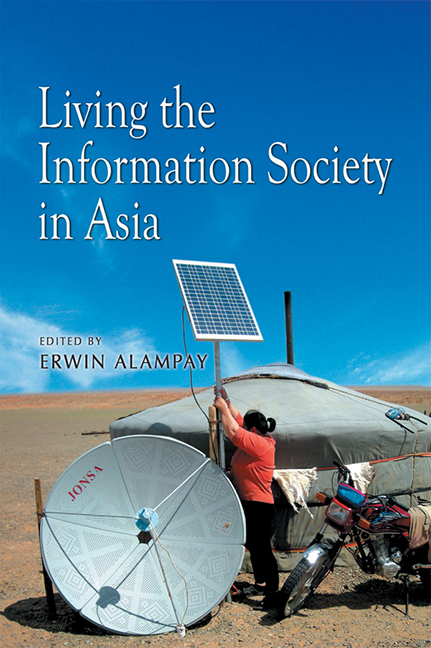Book contents
- Frontmatter
- Contents
- Foreword
- Preface
- List of Abbreviations
- Contributors
- Introduction: Perspectives of ICT Research in Asia
- 1 What Would Durkheim Have Thought? Living in (and with) the Information Society
- 2 What Is a Mobile Phone Relationship?
- 3 Technologies of Transformation: The End of the Social or the Birth of the Cyber Network?
- 4 Becoming Mobile in Contemporary Urban China: How Increasing ICT Usage Is Reformulating the Spatial Dimension of Sociability
- 5 Mobile Religiosity in Indonesia: Mobilized Islam, Islamized Mobility and the Potential of Islamic Techno Nationalism
- 6 Moral Panics and Mobile Phones: The Cultural Politics of New Media Modernity in India
- 7 Stories from e-Bario
- 8 Life and Death in the Chinese Informational City: The Challenges of Working-Class ICTs and the Information Have-less
- 9 Institutional Responses to GIS Adoption for RPTA in Local Governments
- 10 Customer Acquisition among Small and Informal Businesses in Urban India: Comparing Face-to-Face and Mediated Channels
- 11 The View from the Other Side: The Impact of Business Process Outsourcing on the Well-being and Identity of Filipino Call Centre Workers
- 12 Empowering Thai Homeworkers through ICTs
- Index
7 - Stories from e-Bario
Published online by Cambridge University Press: 21 October 2015
- Frontmatter
- Contents
- Foreword
- Preface
- List of Abbreviations
- Contributors
- Introduction: Perspectives of ICT Research in Asia
- 1 What Would Durkheim Have Thought? Living in (and with) the Information Society
- 2 What Is a Mobile Phone Relationship?
- 3 Technologies of Transformation: The End of the Social or the Birth of the Cyber Network?
- 4 Becoming Mobile in Contemporary Urban China: How Increasing ICT Usage Is Reformulating the Spatial Dimension of Sociability
- 5 Mobile Religiosity in Indonesia: Mobilized Islam, Islamized Mobility and the Potential of Islamic Techno Nationalism
- 6 Moral Panics and Mobile Phones: The Cultural Politics of New Media Modernity in India
- 7 Stories from e-Bario
- 8 Life and Death in the Chinese Informational City: The Challenges of Working-Class ICTs and the Information Have-less
- 9 Institutional Responses to GIS Adoption for RPTA in Local Governments
- 10 Customer Acquisition among Small and Informal Businesses in Urban India: Comparing Face-to-Face and Mediated Channels
- 11 The View from the Other Side: The Impact of Business Process Outsourcing on the Well-being and Identity of Filipino Call Centre Workers
- 12 Empowering Thai Homeworkers through ICTs
- Index
Summary
INTRODUCTION
Bario has no road access and previously meagre or non-existent telecommunications services. The e-Bario project provided public telephones, computers for the two schools, a telecentre with computers and satellite access to the Internet. The project's objective is to demonstrate the opportunities for sustainable development in a remote and isolated rural community in the use of ICTs, and how they could be applied to the problems and opportunities for development among remote communities of ethnic minorities. E-Bario has won many awards and was featured by the International Telecommunications Union as “one of the most notable of Malaysia's Internet development initiatives” (ITU 2002). As the project continues to evolve, it is timely to evaluate its outcomes and impact on the community. In this regard, this paper examines a collection of stories told by members of the Bario community and situates them within the context of a wider, more comprehensive evaluation.
STORIES AS RESEARCH
According to Dart and Davies (2003), who originated the Most Significant Change evaluation technique, there are five advantages to using stories for evaluation: engagement, insight, sense-making, memory, and discussing hard messages.
Most Significant Change (MSC) is a methodology for participatory impact monitoring that involves the collection and systematic participatory interpretation of stories of change. It is a qualitative approach that does not rely on quantitative indicators. It has been widely used in the monitoring of aid projects throughout the developing world.
Engagement: Unlike other forms of evaluation which may involve using survey instruments, stories are inherently engaging for people. People love to experience and hear other people's stories. People warm to stories and become engaged. Stories are one of the more participative forms of communication. In the telling of a story, the story can be thought of as being told twice; once by the speaker, the next time by the listener. Stories engage the mind and the person.
Insight: Stories told in casual conversation can harness another sort of information; they provide insights into how storytellers construct reality and to what they attach importance.
- Type
- Chapter
- Information
- Living the Information Society in Asia , pp. 109 - 129Publisher: ISEAS–Yusof Ishak InstitutePrint publication year: 2009

